I don't what it is, but the moment I run my project in debug mode and hits this line within PingServerAsync():
var response = await httpClient.PostAsJsonAsync(url, payload);
it hangs for a sec, then just exists out with no response value. It's NOT hitting my Exception, nor is it logging the response.
public async Task CheckDicomServersAsync(string hostName)
{
...
var cstore = result.FirstOrDefault();
MqttService.applog.Debug($"****** Gonna Dicom Echo this - {cstore.ClientAETitle} *******");
string resp = await **PingDicomServerAsync**(cstore);
Console.WriteLine($"Dicom Echo response: {resp}");
}
private async Task<string> PingServerAsync(DICOMClient client)
{
EchoViewModelSettings payload = new EchoViewModelSettings();
payload.ClientAE = client.ClientAETitle;
// more props here..
using (httpClient)
{
httpClient.BaseAddress = new Uri(m_appConfig.DICOM_URL);
var requestUri = handler + "/Echo?SessionID=" + System.Web.HttpUtility.UrlEncode(session.SessionID.ToString());
try
{
MqttService.applog.Debug($"Make request: {requestUri}");
var url = "http://localhost/MyDicomAPI/api/dicom/Echo?SessionID=my_session";
// *** FIRE POST HERE ***
var response = await httpClient.PostAsJsonAsync(url, payload);
MqttService.applog.Debug($"The Response: {response.Content}");
if (response.IsSuccessStatusCode)
{
var echoResponse = await response.Content.ReadAsStringAsync();
MqttService.applog.Debug($"The Echo Response is: {echoResponse}");
}
if (response.StatusCode == System.Net.HttpStatusCode.OK)
{
Console.WriteLine(response.StatusCode.ToString());
return response.StatusCode.ToString();
}
else
{
return response.StatusCode.ToString();
}
}
catch (Exception ex)
{
MqttService.applog.Error($"WTF is wrong now: {ex}");
throw;
}
}
}
Also checking this video tutorial as a reference - https://www.youtube.com/watch?v=VSAlIE2SFHw
Postman returns a response (value zero is success here) for the same URL and Json body:
*** UPDATE - Showing the calls from the beginning of Program.cs (i.e. temp bypass the Win Service) ***
// **Program.cs**
static void Main()
{
//ServiceBase[] ServicesToRun;
//ServicesToRun = new ServiceBase[]
//{
// new MqttService()
//};
//ServiceBase.Run(ServicesToRun);
MqttService mqttSvc = new MqttService(); // debug version
mqttSvc.**StartDebugMode**();
}
// **MqttService.cs**
public void **StartDebugMode**()
{
Init();
this.**CheckOtherServers**(hostName);
//StartSubscriber();
//StartPublisher();
//PublishHeartBeat(null, null);
}
private async void **CheckOtherServers**(string hostName)
{
if (this.pingDicom)
{
DicomStatus dicom = new DicomStatus();
**await dicom.CheckDicomServersAsync(hostName);**
}
}
